Overview
Managing diabetes can feel overwhelming, especially when faced with additional health issues like cardiovascular diseases, hypertension, and mental health disorders. It's important to recognize that you're not alone in this journey. Understanding and addressing these comorbidities is crucial for your overall health and well-being.
This article offers a comprehensive approach to managing diabetes and its associated conditions. By incorporating strategies such as:
- Regular monitoring
- Integrated care
- Lifestyle modifications
you can take proactive steps towards better health. Remember, mental health support is just as essential, as it plays a significant role in your overall wellness.
We encourage you to seek out resources and support that can guide you through this process. You're not alone, and there are many strategies available that can enhance your health outcomes. Together, we can navigate these challenges and work towards a healthier future.
Introduction
In the intricate journey of diabetes management, it's important to recognize that comorbidities—additional health conditions that often accompany diabetes—can make treatment more challenging and affect overall health outcomes. Conditions like hypertension, obesity, and mental health disorders frequently arise alongside diabetes, highlighting the need for a deeper understanding and a more integrated approach to care.
At T2DSolutions, we understand these challenges and strive to be a pivotal resource for patients navigating this complex landscape. We offer essential educational materials and community support to empower you in your health management journey. By acknowledging the interplay between diabetes and its comorbidities, you can take proactive steps toward better health.
You're not alone in this journey. With the right tools and resources, you can enhance your quality of life and feel more in control. Together, we can work towards a healthier future.
Understanding Diabetes Comorbidities: An Overview
Diabetes comorbidities are additional medical issues that often accompany this condition, such as:
- cardiovascular diseases
- hypertension
- obesity
- mental health disorders
Recognizing these comorbidities is crucial, as they can significantly impact blood sugar management and overall wellness. For instance, if you have diabetes and hypertension, you may face a higher risk of heart disease. This situation calls for a more integrated approach to your treatment, ensuring that all aspects of your health are addressed.
We understand that navigating these challenges can feel overwhelming. That’s why our organization serves as a valuable resource center, offering educational materials and community support to empower you in understanding these relationships. By utilizing the resources available through our service, you can seek suitable interventions and enhance your overall well-being. Remember, you’re not alone in this journey; we are here to support you every step of the way.
We encourage you to explore the resources we provide and take proactive steps toward your health. Together, we can work towards better management of your diabetes and its comorbidities, ensuring a healthier future.
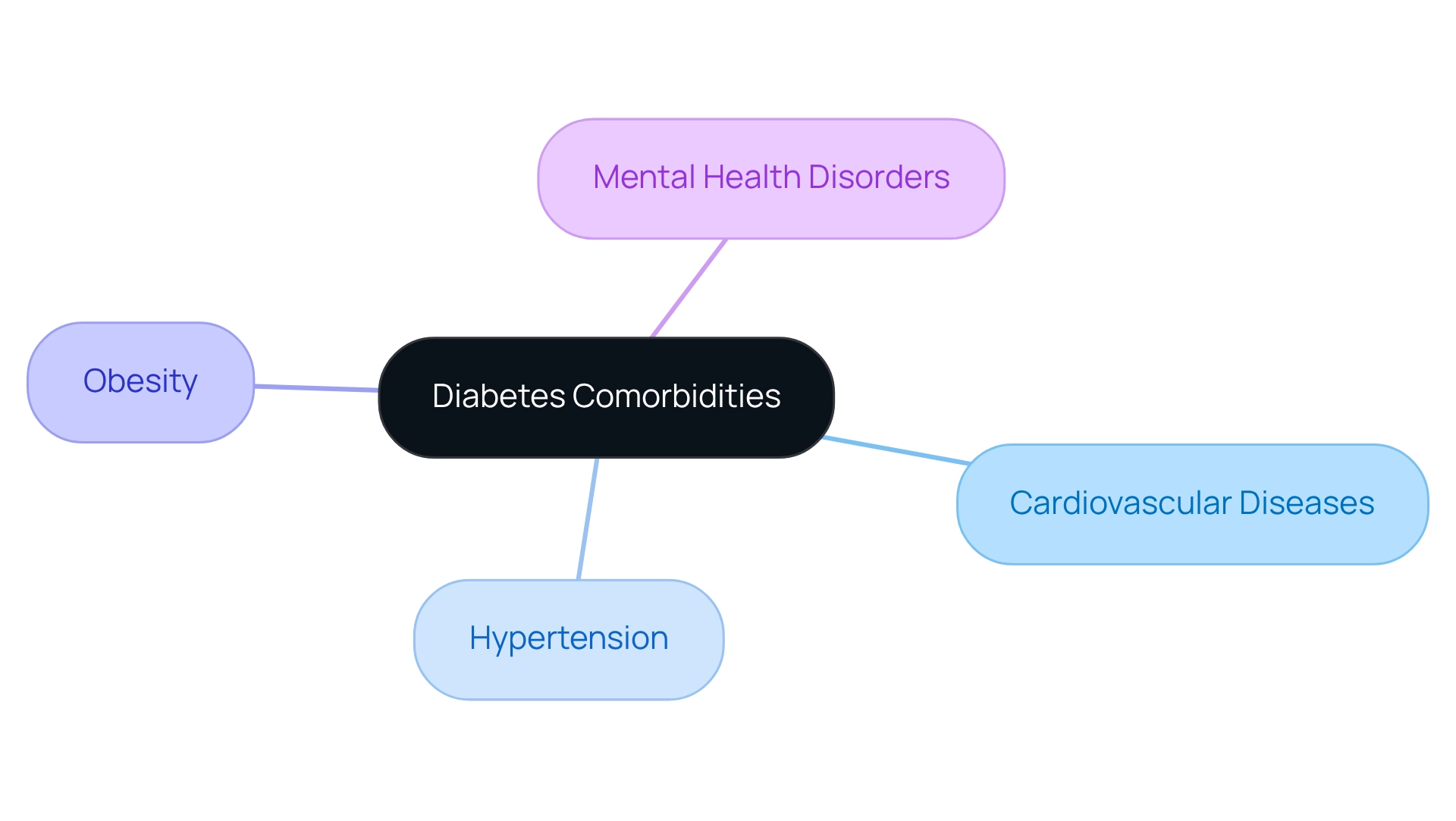
Common Comorbidities in Diabetes: What You Need to Know
At our company, we understand that individuals with blood sugar regulation issues often face diabetes comorbidities that can complicate their journey. These challenges can include:
- Hypertension: High blood pressure is common among those with elevated glucose levels. If left unmanaged, it can lead to serious complications.
- Obesity: Carrying excess weight can worsen insulin resistance, making it even more difficult to maintain glycemic control.
- Dyslipidemia: Abnormal lipid levels increase the risk of cardiovascular diseases, adding another layer of concern.
- Depression and Anxiety: Mental wellness issues are prevalent among patients with elevated glucose levels, impacting their ability to manage their condition effectively.
- Chronic Kidney Disease: Elevated glucose levels are a leading cause of kidney disease, highlighting the importance of regular monitoring of kidney function.
Understanding these diabetes comorbidities is crucial. At T2DSolutions, we are dedicated to providing comprehensive resources and support to help newly diagnosed individuals effectively navigate these challenges. Remember, you're not alone in this journey; we are here to support you every step of the way.
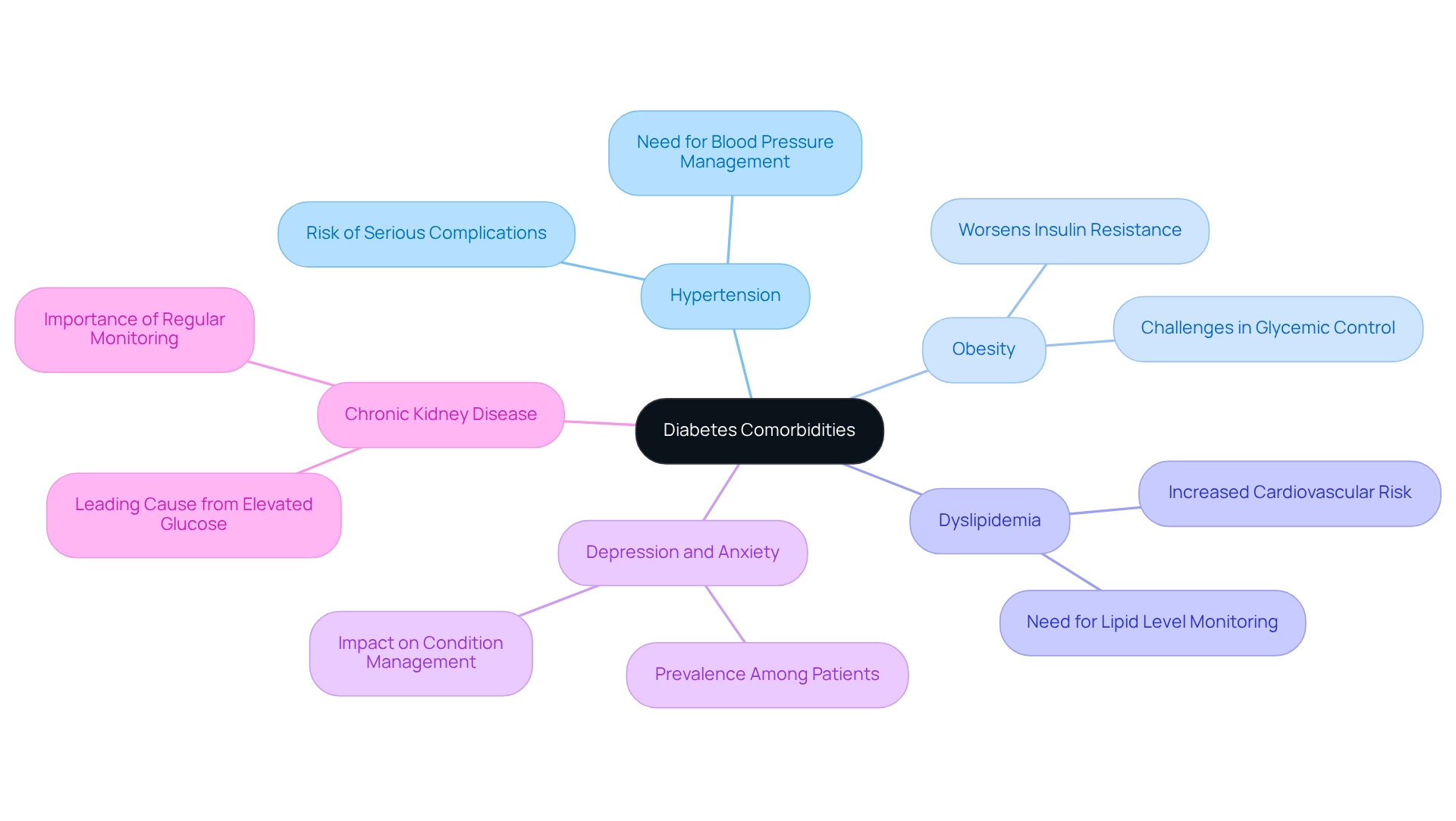
Recognizing Symptoms and Risk Factors of Comorbidities
Identifying the signs and risk factors of comorbidities is essential for proactive wellness management. Common symptoms to monitor include:
- Increased fatigue: This may indicate worsening diabetes control or the onset of another condition.
- Unexplained weight changes: Significant weight gain or loss can signal issues like depression or thyroid problems.
- Frequent headaches or dizziness: These can be signs of hypertension or other cardiovascular issues.
- Changes in mood or anxiety levels: Psychological symptoms can indicate the need for emotional support.
It's important to be aware of risk factors such as family history, lifestyle choices, and age, as these can increase the likelihood of developing comorbidities. At our organization, we are dedicated to offering valuable resources and assistance for individuals dealing with Type 2 Diabetes and its complications. Remember, you're not alone in this journey. We encourage you to subscribe to our updates to stay informed about new content that can assist you in your health journey.
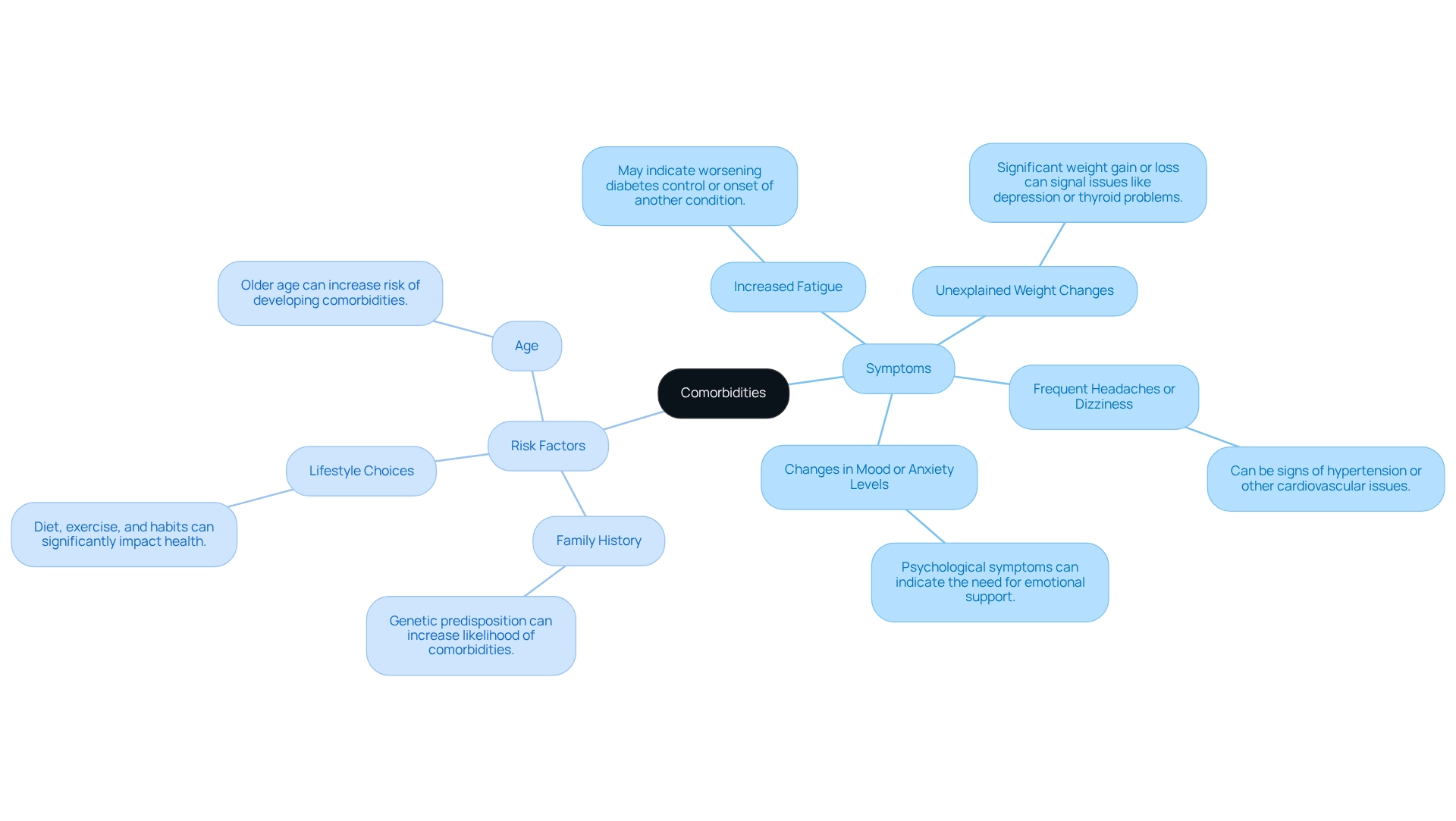
Effective Management Strategies for Diabetes and Comorbidities
Managing blood sugar issues and the conditions that accompany them can feel overwhelming, but you are not alone on this journey. Our team is here to support you every step of the way:
-
Regular Monitoring: It’s essential to keep track of your blood sugar levels, blood pressure, and cholesterol levels to identify any changes early on. We provide tools and resources, including tracking apps and guides, to help you monitor these vital signs effectively. Remember, adhering to your prescribed medication regimen for diabetes and addressing any comorbidities is crucial for preventing complications. We are here to assist you with handling your medications, offering reminders and educational resources to help you understand their importance.
-
Integrated Care: Collaborating with a healthcare team that includes specialists for each of your diabetes comorbidities ensures you receive comprehensive care. Our organization will connect you with healthcare experts within our network who can support your management plan.
-
Patient Education: Engaging in diabetes education programs can empower you to manage your diabetes and its associated conditions effectively. We provide a variety of educational resources, webinars, and community support to help you navigate this path.
-
Lifestyle Changes: Implementing dietary modifications and regular physical activity can greatly enhance your overall well-being and help you manage your weight. We offer advice, recipes, and strategies for making sustainable lifestyle changes.
By embracing these methods and taking advantage of the resources available through our organization, you can improve your wellness results and overall quality of life. Remember, we are here to support you throughout this journey.
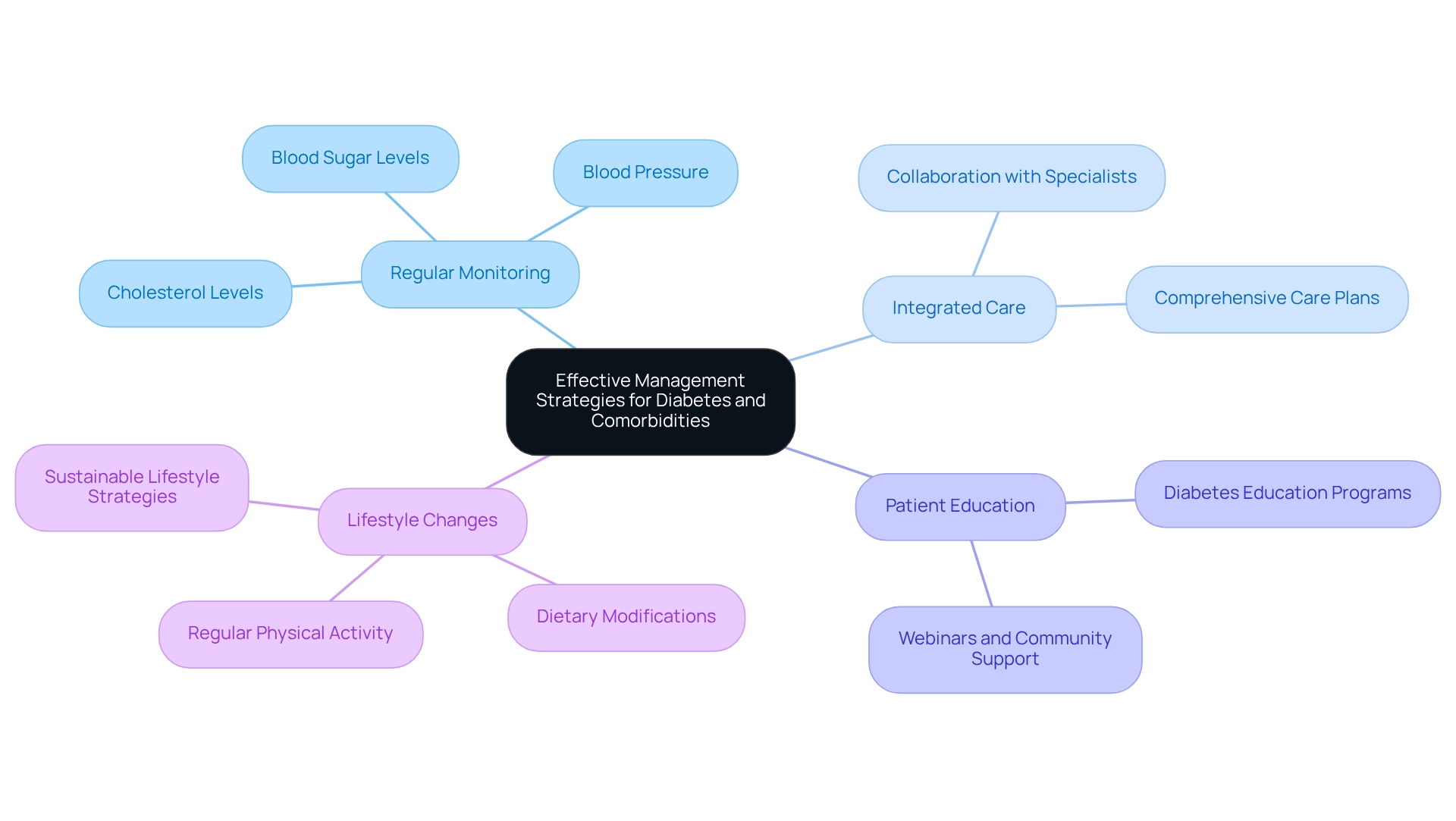
The Role of Healthcare Providers in Managing Comorbidities
Healthcare providers play a vital role in supporting individuals managing blood sugar conditions and their comorbidities. They do this through:
-
Comprehensive Assessments: Regular evaluations help identify comorbidities and allow for adjustments in treatment plans. This process is supported by resources from specialized organizations, including detailed health assessments and personalized care plans tailored to individual needs.
-
Patient Education: It’s important to provide information on managing blood sugar conditions and diabetes comorbidities. This includes lifestyle modifications, with access to educational materials available through the organization, such as webinars, guides, and interactive tools designed specifically for those who are newly diagnosed.
-
Coordinated Care: Collaboration with other specialists, like cardiologists or mental health professionals, ensures holistic care that addresses diabetes comorbidities. The community support offered by the organization facilitates this collaboration, providing referral networks and integrated care teams to enhance patient well-being.
-
Support and Resources: Access to support groups, educational materials, and community resources is crucial for self-management, especially when dealing with diabetes comorbidities. The organization offers success stories and testimonials from patients who have benefited from these resources, creating a sense of hope and encouragement.
It’s completely understandable to feel overwhelmed at times. Patients should feel empowered to communicate openly with their healthcare team about their concerns and treatment preferences. Remember, you are not alone in this journey; the organization is here to support you every step of the way.
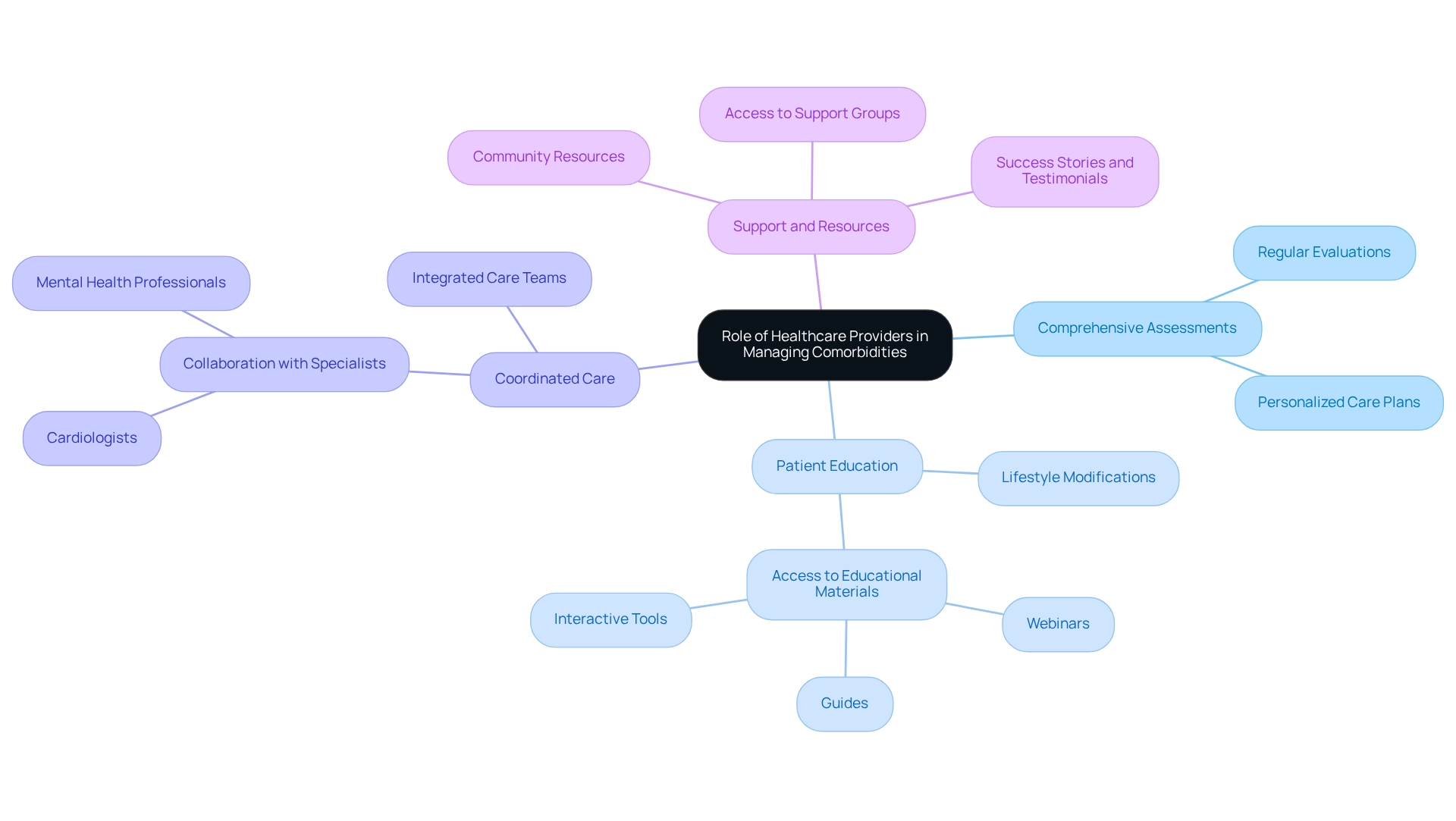
Lifestyle Modifications: Diet and Exercise for Better Management
Lifestyle changes are essential for effectively managing blood sugar issues and their associated conditions. We understand that this journey can feel overwhelming, and we are here to support you every step of the way:
-
Diet: Focus on a balanced diet rich in whole grains, lean proteins, fruits, and vegetables. It’s important to limit processed foods, sugars, and saturated fats. Our service provides access to registered dietitians who can assist you in developing a personalized meal plan tailored to your needs.
-
Exercise: Aim for at least 150 minutes of moderate-intensity aerobic activity each week, combined with strength training exercises. Regular physical activity can help improve insulin sensitivity and manage weight. We offer resources, such as exercise programs and community support, to help you stay active.
-
Weight Management: Achieving and maintaining a healthy weight can significantly lower the risk of complications related to blood sugar issues and diabetes comorbidities. T2DSolutions is here to provide advice, resources, and assistance to help you reach your weight management goals.
By implementing these changes, you can improve your overall well-being and manage your condition more effectively. Remember, you're not alone in this journey; T2D Solutions serves as a comprehensive resource for managing Type 2 and Type 3 conditions.
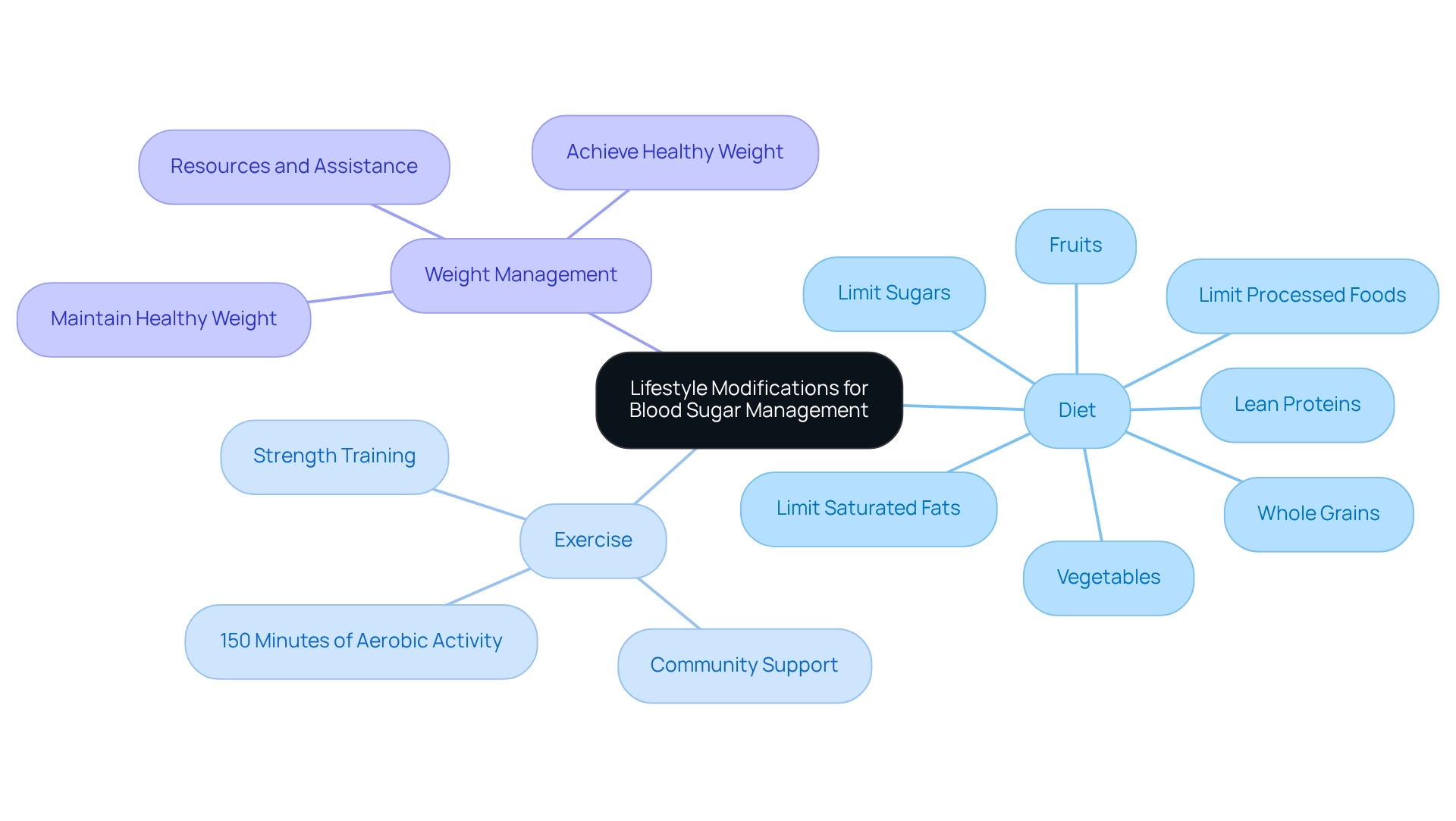
Mental Health Considerations in Diabetes Management
Mental well-being is a vital aspect of effectively managing blood sugar levels. Individuals facing this condition often find themselves more susceptible to mental health challenges, particularly depression and anxiety, which can hinder their ability to manage their health effectively. It’s important to consider the following key aspects when addressing mental health in diabetes management:
-
Regular Screening: It’s essential for healthcare providers to routinely screen patients for mental health issues. Identifying problems like depression early can lead to timely interventions, which are crucial for improving overall well-being outcomes. Unfortunately, current screening rates for mental health in blood sugar management are still lacking, highlighting the need for greater awareness and proactive measures. It’s significant to note that non-compliance with medication plans in individuals with depression who develop blood sugar issues increases the risk of complications such as cardiovascular disease, neuropathy, and retinopathy.
-
Support Systems: Building a strong support network is incredibly important. Encouraging connections with family, friends, and support groups can provide both emotional support and practical coping strategies. Sharing experiences with others who face similar challenges fosters resilience and can greatly enhance an individual's ability to cope with their condition. T2DSolutions offers a community platform where newly diagnosed individuals can connect with others and access valuable resources.
-
Therapeutic Interventions: Research shows that therapeutic approaches, such as cognitive-behavioral therapy (CBT), can significantly improve both glycemic control and psychological well-being in individuals with high blood sugar. These interventions address the emotional struggles associated with blood sugar management, helping individuals develop healthier coping strategies. A case study titled "Cost-effectiveness of Community-Based Integrated Care Model for Individuals with Chronic Blood Sugar Issues and Depressive Symptoms" underscores the importance of integrated care models that combine pharmacological treatments for blood sugar management with psychological support to enhance wellness outcomes and quality of life for those experiencing both conditions.
-
Mindfulness and Stress Reduction: Embracing mindfulness practices, including meditation, yoga, and relaxation exercises, can lead to improved mental well-being and better blood sugar management. These techniques not only help reduce stress but also enhance patients' overall quality of life, making it easier to stick to management plans.
Addressing mental well-being is not just an addition to diabetes management; it’s a crucial component that can lead to improved health outcomes. Recent research emphasizes that the relationship between blood sugar regulation and mental well-being requires a holistic approach, integrating psychological support with traditional management strategies. Dr. Marika Kaakinen noted, "Our findings, derived from extensive genetic research involving hundreds of thousands of individuals and their medical data, provide insights into the characterization of personal pathways to illnesses and the likelihood of comorbidities."
By prioritizing mental well-being, individuals can achieve more comprehensive and effective control over their condition. Additionally, public health initiatives should work to raise awareness and educate individuals about effective strategies for managing both blood sugar levels and depression. The organization is committed to providing resources and support to help individuals navigate these challenges.

Finding Support: Resources and Community for Patients
Obtaining assistance is crucial for individuals dealing with blood sugar issues and diabetes comorbidities. At our new platform dedicated to managing health conditions, we are committed to empowering individuals and families through comprehensive management resources and community support. We understand that navigating these challenges can be overwhelming, and we are here to help.
Our offerings include:
- Support Groups: Both local and online support groups provide a welcoming platform for sharing experiences and coping strategies with others facing similar challenges. This fosters a sense of community, reminding you that you're not alone in this journey.
- Educational Programs: Our educational programs focus on managing blood sugar levels and associated conditions, offering valuable information often led by certified educators dedicated to empowering individuals like you.
- Community Resources: Organizations such as the American Diabetes Association and local health departments provide essential resources, workshops, and events focused on blood sugar management. We ensure you have access to the latest information and support.
- Mental Health Services: Access to mental health professionals specializing in chronic illness is crucial for emotional well-being. We recognize the importance of mental health in managing blood sugar levels, and we are here to support you.
In addition, our organization will be hosting upcoming events aimed at further supporting our community. We encourage patients to utilize these resources, as doing so can foster a sense of community and improve overall management of diabetes comorbidities. This aligns with T2D Solutions' mission to be your comprehensive resource for Type 2 and Type 3 diabetes management. Remember, we are here to support you every step of the way.
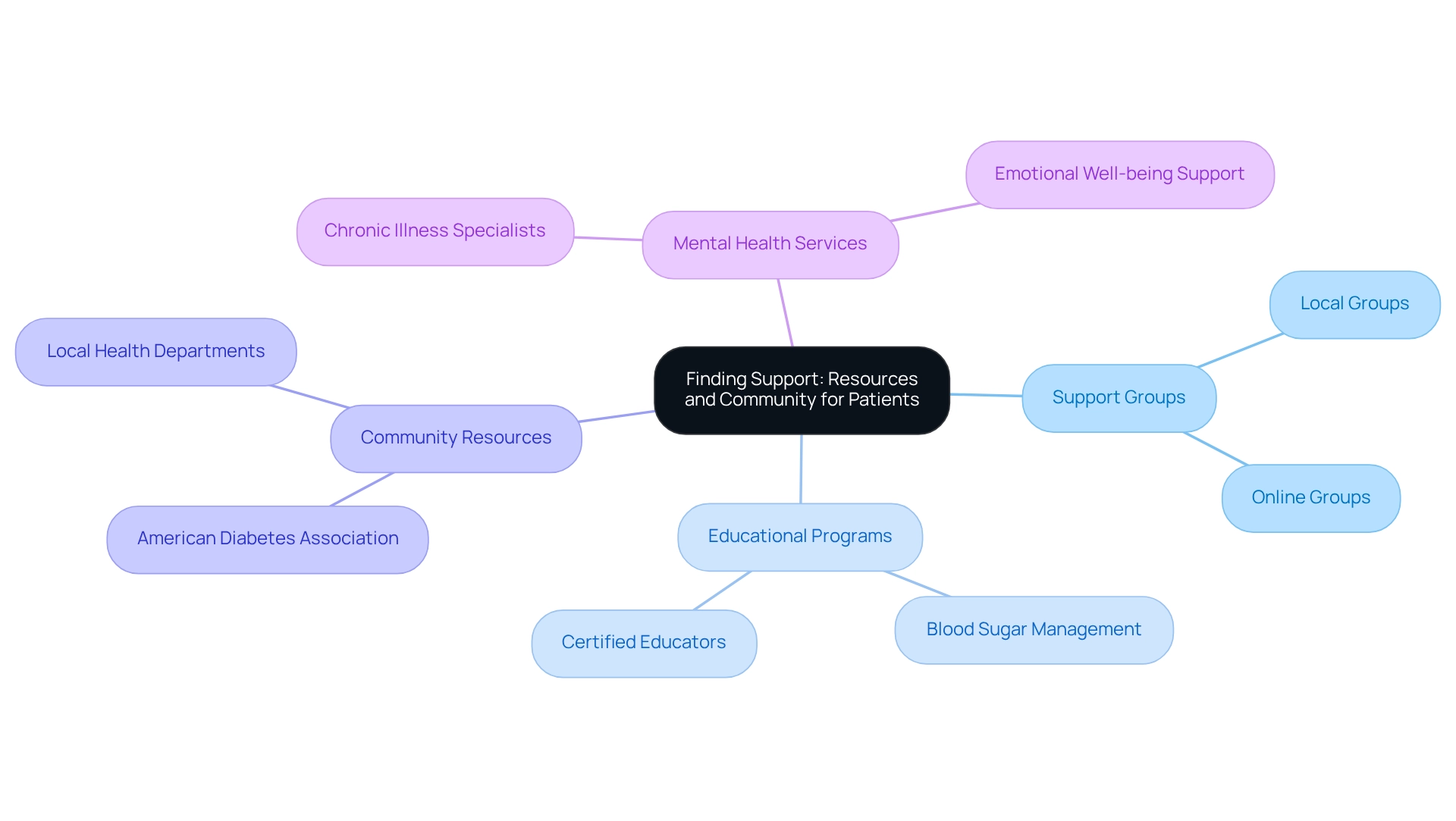
Conclusion
Recognizing and addressing the comorbidities associated with diabetes is vital for effective health management. Conditions such as hypertension, obesity, and mental health disorders can complicate diabetes treatment and significantly impact overall health outcomes. By understanding these comorbidities, you can take proactive steps to enhance your health and well-being.
Utilizing available resources from T2DSolutions can empower you to manage your diabetes more effectively. Regular monitoring, medication adherence, integrated care, and lifestyle modifications are key strategies that can lead to improved health outcomes. It's also important to address mental health, as it plays a significant role in diabetes management. Building a supportive network and engaging in therapeutic interventions can enhance resilience and promote better control over diabetes.
Ultimately, you are not alone in this journey. With the right education, community support, and resources, you can navigate the complexities of diabetes and its comorbidities. By prioritizing your health and utilizing the tools provided by T2DSolutions, you can work towards achieving a healthier and more fulfilling life. Together, the path to better health is within reach.
Frequently Asked Questions
What are diabetes comorbidities?
Diabetes comorbidities are additional medical issues that often accompany diabetes, including cardiovascular diseases, hypertension, obesity, and mental health disorders.
Why is it important to recognize diabetes comorbidities?
Recognizing these comorbidities is crucial because they can significantly impact blood sugar management and overall wellness. For example, having both diabetes and hypertension increases the risk of heart disease.
What challenges do individuals with diabetes face regarding comorbidities?
Individuals with diabetes may face challenges such as hypertension, obesity, dyslipidemia, depression and anxiety, and chronic kidney disease, all of which can complicate their condition and management.
How does obesity affect diabetes management?
Carrying excess weight can worsen insulin resistance, making it more difficult to maintain glycemic control.
What role does mental health play in managing diabetes?
Mental wellness issues, such as depression and anxiety, are prevalent among individuals with elevated glucose levels, impacting their ability to manage their diabetes effectively.
What resources are available for individuals dealing with diabetes comorbidities?
Organizations like T2DSolutions provide educational materials and community support to help individuals understand and navigate the challenges associated with diabetes comorbidities.
How can individuals take proactive steps toward their health in relation to diabetes comorbidities?
Individuals are encouraged to explore the resources provided by support organizations and seek suitable interventions to enhance their overall well-being in managing diabetes and its comorbidities.
